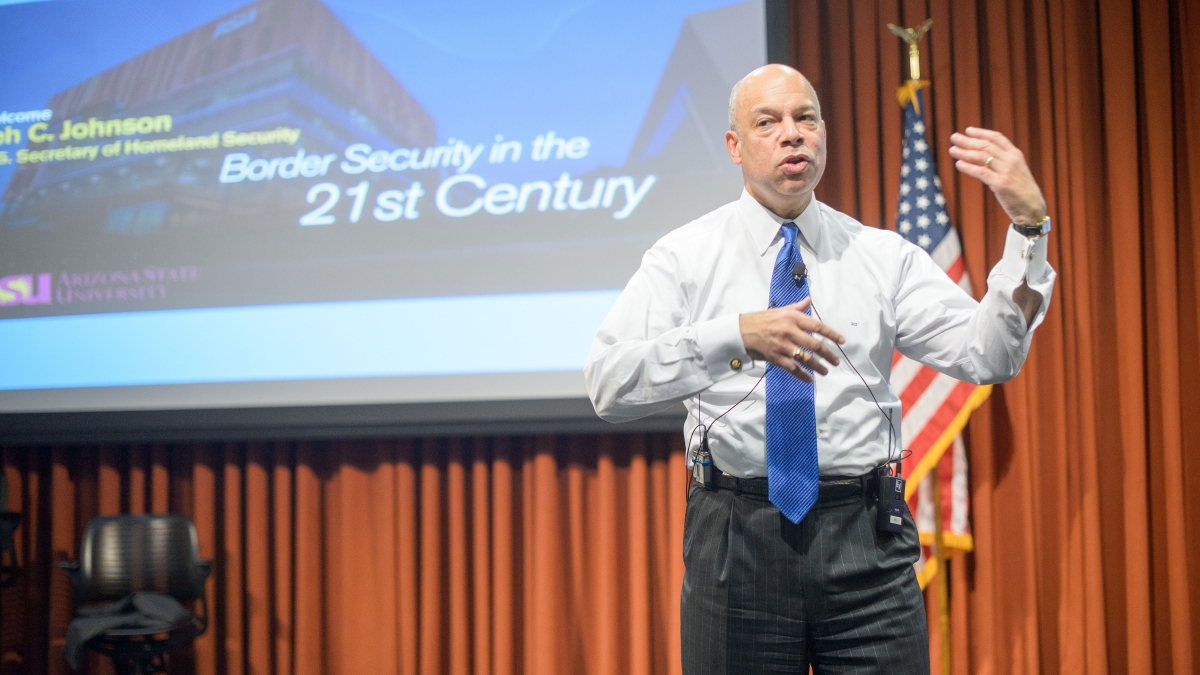Secretary Johnson addresses students during surprise visit to ASU

There are plenty of things that could keep U.S. Secretary of Homeland Defense Jeh Johnson up at night – use of weapons of mass destruction, terrorist and cyber attacks, and protecting our borders – but how to fund and maintain the third-largest department in the U.S. government is among his chief concerns.
Johnson made a surprise visit to ASU's Walter Cronkite School of Journalism and Mass Communication on the Downtown Phoenix campus on Jan. 28. He was there to deliver remarks on “Borderland Security in the 21st Century,” to approximately 140 students who study journalism, criminology and public policy.
The Homeland Security chief was in Phoenix to view the Department of Homeland Security's security operations surrounding Super Bowl XLIX and to participate in workforce engagements with U.S. Customs and Border Protection Personnel. Johnson said he consulted with U.S. Senator John McCain before he departed for Arizona on where to deliver his speech.
“Senator McCain told me, 'The Cronkite School,'" Johnson said. "So here I am.”
Johnson said the Cronkite name personally resonated with he and his family because he grew up watching the CBS news anchor in New York during the 1960s and 1970s.
“If we heard of something tragic happening during the day, well, it didn't really happen until Walter Cronkite said it happened,” Johnson said. “That's how much he meant in my household growing up.”
Johnson is hoping that his word is as good as Cronkite's when it comes to public perception that our borders are less secure than they were in 2003, when his department was created by the federal government. To prove his point, Johnson presented audience members with a chart of immigrant apprehensions from 2000 to 2014. The numbers were cut dramatically from 1.6 million in 2000 to approximately 479,000 in 2014.
He cites the reason for the decline is due to better policing and enforcement – more than 20,000 agents, construction of 90 miles of primary and secondary fences along the U.S.- Mexico border, deployment of more sensors, aircraft and a variety of surveillance systems since 2000.
All of that enforcement, Johnson says, takes approximately 250,000 personnel and money to secure the country's air, sea, land and space, to the tune of $60 billion a year, which is his department's annual budget. However, he said that the department is funded on a contingency basis, set to expire Feb. 27, and is calling on Congress to increase funding for his department and on a more permanent basis.
“Everybody in Congress is telling me we've got to do something,” Johnson said. “I cannot print money and I cannot appropriate money. I need a partner in Congress.”
To underscore his point, Johnson said his agency asked for close to $4 billion in emergency funding to pay for the surge of immigrant children in the Rio Grande Valley, but Congress refused. He said Homeland Security was forced to shift more than $400 million from the disaster relief fund and the Transportation Security Industry to make ends meet.
“Fortunately we had a good weather year last year, but I do not assume that we're going to be that lucky this year,” Johnson said.
Johnson ended his 45-minute lecture by imploring students to consider a career in public service.
“It's one of the noblest things you will ever do, and it has been a great career,” Johnson said. “Some of the best people I've ever known are in public service.”